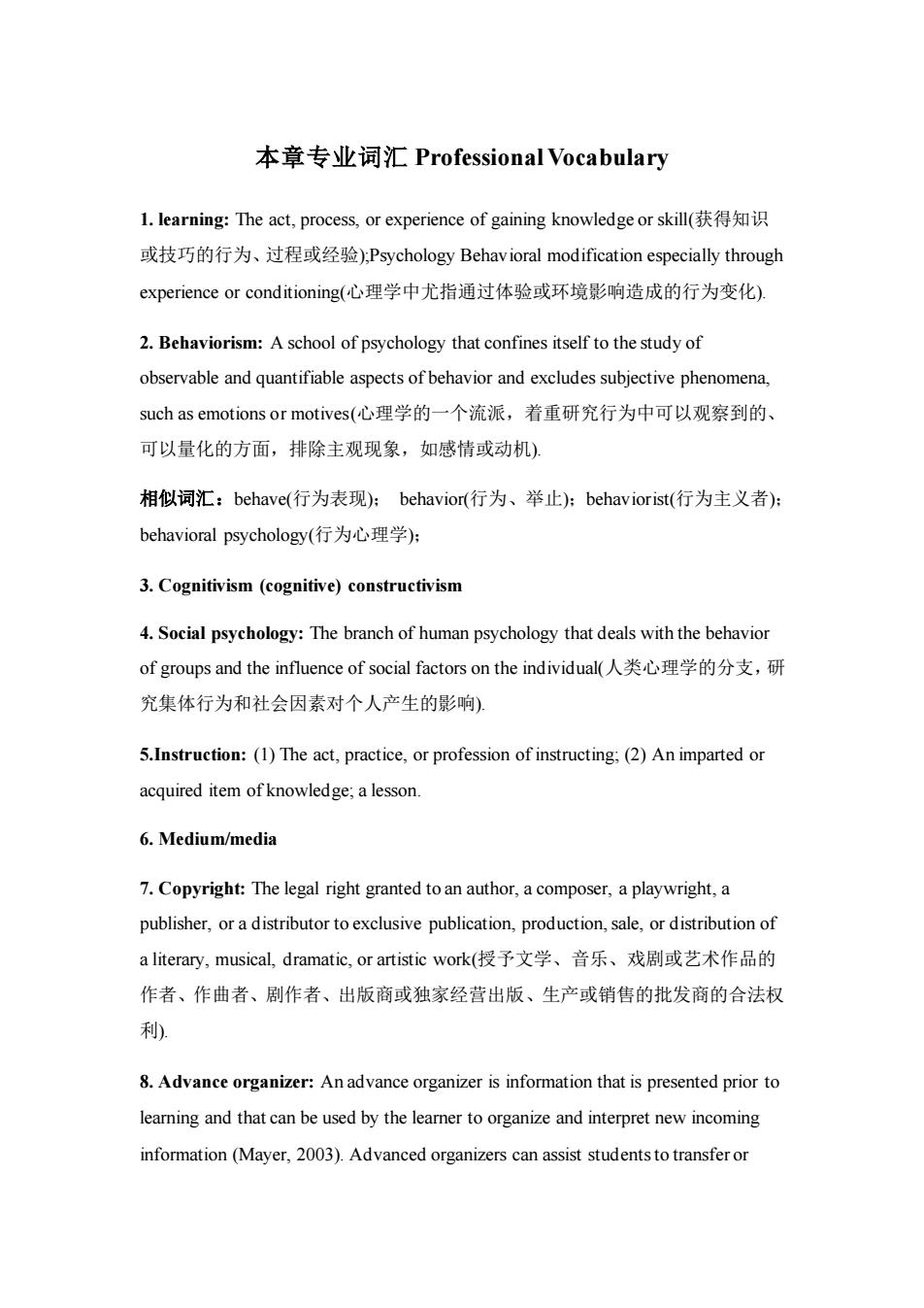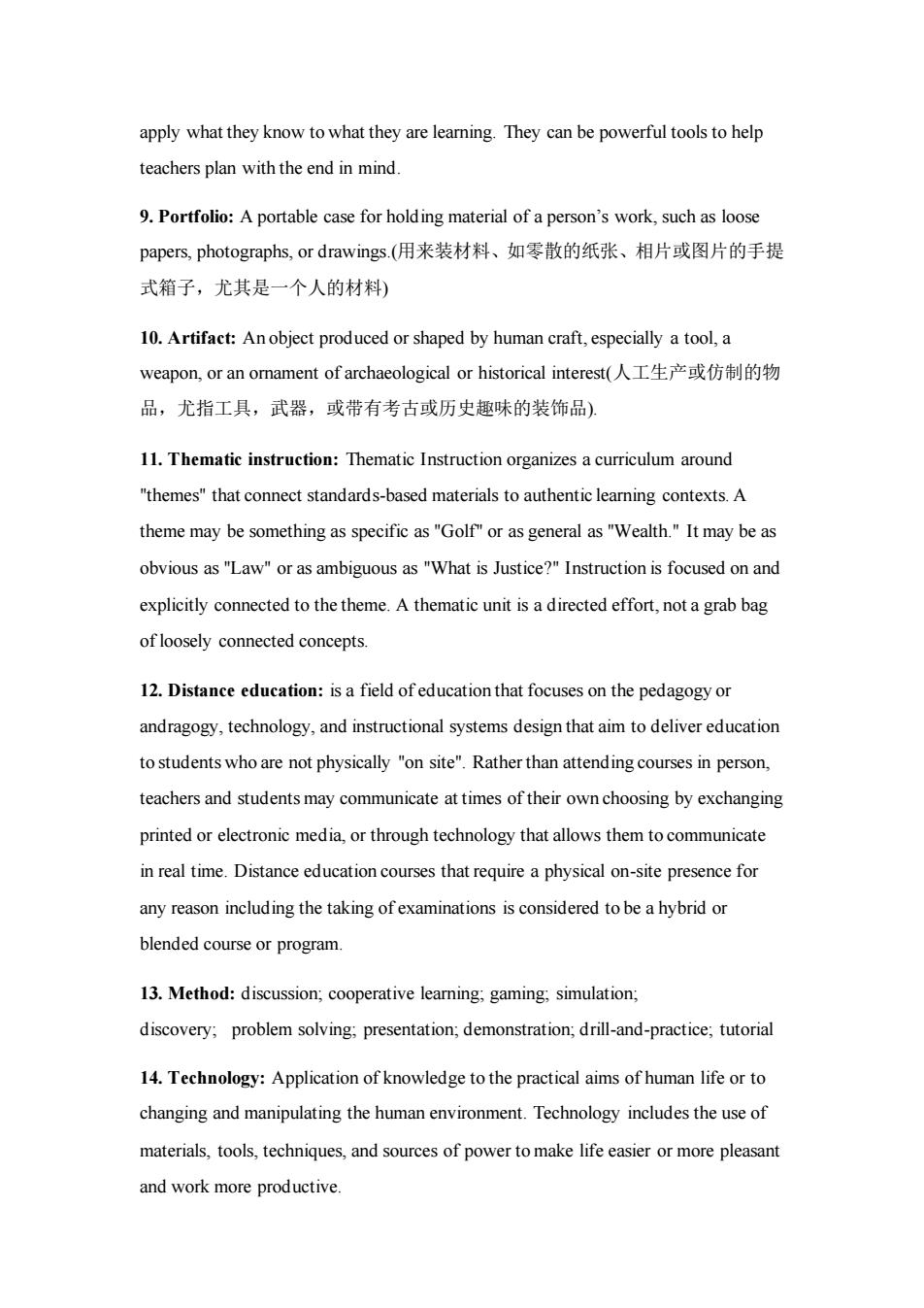
本章专业词汇Professional Vocabulary L.learning:The act,.process,or experience of gaining knowledge or skill(获得知识 或技巧的行为、过程或经验),Psychology Behavioral modification especially through experience or conditioning(心理学中尤指通过体验或环境影响造成的行为变化), 2.Behaviorism:A school of psychology that confines itself to the study of observable and quantifiable aspects of behavior and excludes subjective phenomena, such as emotions or motives(心理学的一个流派,着重研究行为中可以观察到的、 可以量化的方面,排除主观现象,如感情或动机) 相似词汇:behave(行为表现):behavion(行为、举止):behaviorist(行为主义者): behavioral psychology(行为心理学): 3.Cognitivism(cognitive)constructivism 4.Social psychology:The branch of human psychology that deals with the behavior of groups and the influence of social factors on the individual(人类心理学的分支,研 究集体行为和社会因素对个人产生的影响). 5.Instruction:(1)The act,practice,or profession of instructing:(2)An imparted or acquired item ofknowledge,a lesson. 6.Medium/media 7.Copyright:The legal right granted to an author,a composer,a playwright,a publisher.or a distributor toexcusive publication.production,salerdistribution of a literary,musical,dramatic,or artistic work(授予文学、音乐、戏剧或艺术作品的 作者、作曲者、剧作者、出版商或独家经营出版、生产或销售的批发商的合法权 利 8.Advance organier:Anadvance organizer is information that is presented prior to leaming and that can be used by the leamer to organize and interpret new incoming information(Mayer,2003).Advanced organizers can assist students to transfer or
本章专业词汇 Professional Vocabulary 1. learning: The act, process, or experience of gaining knowledge or skill(获得知识 或技巧的行为、过程或经验);Psychology Behavioral modification especially through experience or conditioning(心理学中尤指通过体验或环境影响造成的行为变化). 2. Behaviorism: A school of psychology that confines itself to the study of observable and quantifiable aspects of behavior and excludes subjective phenomena, such as emotions or motives(心理学的一个流派,着重研究行为中可以观察到的、 可以量化的方面,排除主观现象,如感情或动机). 相似词汇:behave(行为表现); behavior(行为、举止);behaviorist(行为主义者); behavioral psychology(行为心理学); 3. Cognitivism (cognitive) constructivism 4. Social psychology: The branch of human psychology that deals with the behavior of groups and the influence of social factors on the individual(人类心理学的分支,研 究集体行为和社会因素对个人产生的影响). 5.Instruction: (1) The act, practice, or profession of instructing; (2) An imparted or acquired item of knowledge; a lesson. 6. Medium/media 7. Copyright: The legal right granted to an author, a composer, a playwright, a publisher, or a distributor to exclusive publication, production, sale, or distribution of a literary, musical, dramatic, or artistic work(授予文学、音乐、戏剧或艺术作品的 作者、作曲者、剧作者、出版商或独家经营出版、生产或销售的批发商的合法权 利). 8. Advance organizer: An advance organizer is information that is presented prior to learning and that can be used by the learner to organize and interpret new incoming information (Mayer, 2003). Advanced organizers can assist students to transfer or

apply what they know to what they are leaming.They can be powerful tools to help teachers plan with the end in mind. 9.Portfolio:A portable case for holding material of a person's work,such as loose papers,photographs,or drawings.(用来装材料、如零散的纸张、相片或图片的手提 式箱子,尤其是一个人的材料) 10.Artifaet:Anobject produced or shaped by human craft,especially a tool,a weapon,.or an omament of archaeological or historical interest(人工生产或仿制的物 品,尤指工具,武器,或带有考古或历史趣味的装饰品) 11.Thematic instruction:Thematic Instruction organizes a around "themes"that connect standards-based materials to authentic leaming contexts.A theme may be something as specific as"Golf"or as general as"Wealth."It may be as obvious as"Lawor as ambiguous as"What is Justice?"Instruction is focused on and explicitly connected to the theme.A thematic unit is a directed effort,not a grab bag of loosely connected concepts. 12.Distance education:is a field ofeducation that focuses on the pedagogy or andragogy,technology,and instructional systems design that aim to deliver education to students who are not physically "on site".Rather than attending courses in person, teachers and students may communicate at times of their own choosing by exchanging printed or electronic media,or through technology that allows them to communicate in real time.Distance education courses that require a physical on-site presence for any reason including the taking of examinations is considered to be a hybrid or blended course or program. 13.Method:discussion,cooperative learning:gaming simulation, discovery:problem solving:presentation;demonstration;drill-and-practice:tutorial 14.Technology:Application of knowledge to the practical aims of human life or to changing and manipulating the human environment.Technology includes the use of materials,tools,techniques,and sources of power to make life easier or more pleasant and work more productive
apply what they know to what they are learning. They can be powerful tools to help teachers plan with the end in mind. 9. Portfolio: A portable case for holding material of a person’s work, such as loose papers, photographs, or drawings.(用来装材料、如零散的纸张、相片或图片的手提 式箱子,尤其是一个人的材料) 10. Artifact: An object produced or shaped by human craft, especially a tool, a weapon, or an ornament of archaeological or historical interest(人工生产或仿制的物 品,尤指工具,武器,或带有考古或历史趣味的装饰品). 11. Thematic instruction: Thematic Instruction organizes a curriculum around "themes" that connect standards-based materials to authentic learning contexts. A theme may be something as specific as "Golf" or as general as "Wealth." It may be as obvious as "Law" or as ambiguous as "What is Justice?" Instruction is focused on and explicitly connected to the theme. A thematic unit is a directed effort, not a grab bag of loosely connected concepts. 12. Distance education: is a field of education that focuses on the pedagogy or andragogy, technology, and instructional systems design that aim to deliver education to students who are not physically "on site". Rather than attending courses in person, teachers and students may communicate at times of their own choosing by exchanging printed or electronic media, or through technology that allows them to communicate in real time. Distance education courses that require a physical on-site presence for any reason including the taking of examinations is considered to be a hybrid or blended course or program. 13. Method: discussion; cooperative learning; gaming; simulation; discovery; problem solving; presentation; demonstration; drill-and-practice; tutorial 14. Technology: Application of knowledge to the practical aims of human life or to changing and manipulating the human environment. Technology includes the use of materials, tools, techniques, and sources of power to make life easier or more pleasant and work more productive